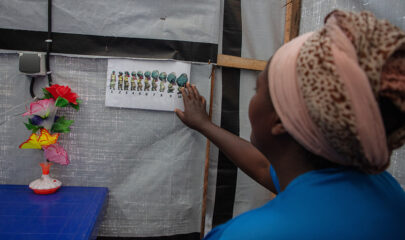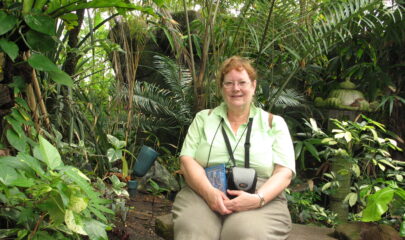“I’m surprised,” says Marie-Thérèse*. “Surprised that MSF would want to help with something like this. It’s so personal.”
She is talking during a discussion group for a new project our team has been piloting in South Kivu, in Democratic Republic of Congo (DRC).
The project aims to assess the viability of distributing menstrual underwear to women who have been displaced in the region. Menstrual underwear is made with special fabric so it’s absorbent, washable and reusable.
The idea came from a colleague who found it to be the best option for herself in the challenging contexts where Doctors Without Borders/Médecins Sans Frontières (MSF) operates. If menstrual underwear worked for her, she wondered if it could also work for women living in camps for displaced people or other crisis situations who face significantly more challenges and barriers to menstrual hygiene choices. South Kivu has seen repeated cycles of armed violence between communities, forcing thousands to flee for their lives. In their search for safety, people in this remote area often find themselves with no access to essentials like water, food or healthcare.
In December, I met a woman who told us that she’d woken in the middle of the night to find her house on fire around her: her village was being attacked. She managed to escape, but there was no time to grab anything. When our team met her, she was living in a 10 square metre schoolhouse with 40 other people, and had no bedding, no spare clothes, nothing.
In the discussion groups on access to menstrual hygiene we’ve been running with women who have been through similar experiences, they have told us that in the aftermath of a crisis, they are completely dependent on materials they can find around them to help manage menstruation. Often these materials are not safe or hygienic, which can impact both women’s physical health and their mental wellbeing. But menstrual hygiene isn’t always considered in an emergency response.
The women in the groups have shared their views and helped us understand the needs and cultural perceptions around this sensitive topic, helping enable us to begin the next phase of the pilot. After several delays due to violence and insecurity in the area, from the first week in February we’ve been distributing menstrual underwear to 200 women, who have agreed to test it and share their feedback.
Whatever the final conclusions of the trial, I hope this project has shown how vital it is that menstrual hygiene is a component in every emergency response, especially with people who have been displaced. Consulting the affected community from the start has given us the opportunity to learn, to build a stronger connection with them and to optimize our approach – something we’ll prioritize in future initiatives.
For now, our team is focused on the distribution and looking forward to hearing what the women have to say. They have already given us ideas for the next phase of the project.
*Name changed to protect privacy.


